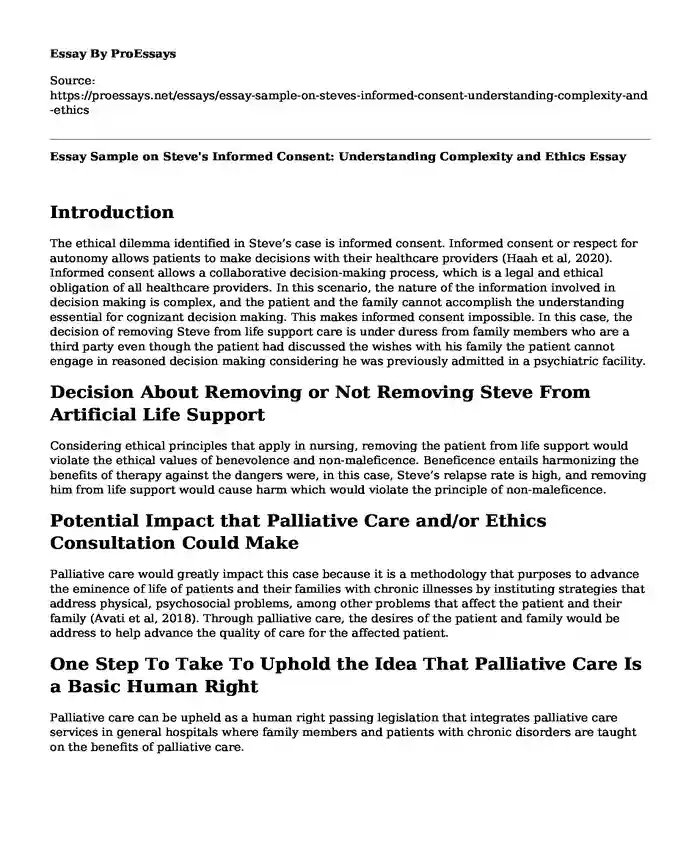Introduction
The ethical dilemma identified in Steve’s case is informed consent. Informed consent or respect for autonomy allows patients to make decisions with their healthcare providers (Haah et al, 2020). Informed consent allows a collaborative decision-making process, which is a legal and ethical obligation of all healthcare providers. In this scenario, the nature of the information involved in decision making is complex, and the patient and the family cannot accomplish the understanding essential for cognizant decision making. This makes informed consent impossible. In this case, the decision of removing Steve from life support care is under duress from family members who are a third party even though the patient had discussed the wishes with his family the patient cannot engage in reasoned decision making considering he was previously admitted in a psychiatric facility.
Decision About Removing or Not Removing Steve From Artificial Life Support
Considering ethical principles that apply in nursing, removing the patient from life support would violate the ethical values of benevolence and non-maleficence. Beneficence entails harmonizing the benefits of therapy against the dangers were, in this case, Steve’s relapse rate is high, and removing him from life support would cause harm which would violate the principle of non-maleficence.
Potential Impact that Palliative Care and/or Ethics Consultation Could Make
Palliative care would greatly impact this case because it is a methodology that purposes to advance the eminence of life of patients and their families with chronic illnesses by instituting strategies that address physical, psychosocial problems, among other problems that affect the patient and their family (Avati et al, 2018). Through palliative care, the desires of the patient and family would be address to help advance the quality of care for the affected patient.
One Step To Take To Uphold the Idea That Palliative Care Is a Basic Human Right
Palliative care can be upheld as a human right passing legislation that integrates palliative care services in general hospitals where family members and patients with chronic disorders are taught on the benefits of palliative care.
References
Avati, A., Jung, K., Harman, S., Downing, L., Ng, A., & Shah, N. H. (2018). Improving palliative care with deep learning. BMC medical informatics and decision making, 18(4), 122. https://link.springer.com/article/10.1186/s12911-018-0677-8
Haahr, A., Norlyk, A., Martinsen, B., & Dreyer, P. (2020). Nurses experiences of ethical dilemmas: a review. Nursing Ethics, 27(1), 258-272. https://journals.sagepub.com/doi/abs/10.1177/0969733019832941
Cite this page
Essay Sample on Steve's Informed Consent: Understanding Complexity and Ethics. (2023, Sep 25). Retrieved from https://proessays.net/essays/essay-sample-on-steves-informed-consent-understanding-complexity-and-ethics
If you are the original author of this essay and no longer wish to have it published on the ProEssays website, please click below to request its removal:
- Research Paper on Hypoglycemia
- Evidence-Based Interventions on Vaccine Hesitancy
- Moral Responsiveness Despite Technological Advancement Essay
- Nursing Leadership and Advocacy Essay
- Annotated Bibliography on Social Networking on Society
- Essay on Cross-Cultural Communication in Romantic Relationships: A Study of Early Stages
- Essay Example - NBA YoungBoy's Harmonious Hip-Hop: Breaking Stereotypes and Uniting Fans







